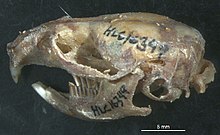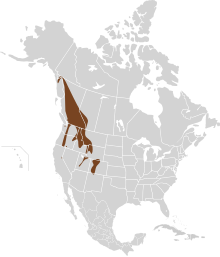Western heather vole
| Western heather vole | |
|---|---|

| |
| Scientific classification | |
| Kingdom: | Animalia |
| Phylum: | Chordata |
| Class: | Mammalia |
| Order: | Rodentia |
| Family: | Cricetidae |
| Subfamily: | Arvicolinae |
| Genus: | Phenacomys |
| Species: | P. intermedius
|
| Binomial name | |
| Phenacomys intermedius (Merriam, 1889)
| |

| |
The western heather vole (Phenacomys intermedius) is a small vole found in western North America. Until recently, the eastern heather vole, (Phenacomys ungava), was considered to be a subspecies.
These animals are similar in appearance to the meadow vole. They have short ears and a short thin tail which is paler underneath. Their long soft fur is brownish with silver grey underparts. They are 14 cm long with a 3.5 cm tail and weigh about 40 g.
They are found in alpine meadows, open shrubby areas, dry forests with shrubs below to provide cover and tundra regions, usually near water, in British Columbia, the Yukon and the western United States. In summer, they live in burrows and, in winter, they tunnel under the snow. They store food for later use year-round.
They feed on plant leaves and berries in summer and plant bark and buds in winter, also seeds and fungi. Predators include owls, hawks and carnivorous mammals.
The female vole has 2 or 3 litters of 2 to 9 young in a nest made from grasses.
They are active year-round, and are crepuscular.
The population of this animal has been reduced in some parts of its range because of clearcutting of forests.
References[]
- ^ Linzey, A.V.; NatureServe; Reichel, J.D. & Hammerson, G. (2008). "Phenacomys intermedius". IUCN Red List of Threatened Species. 2008. Retrieved 10 July 2009. Database entry includes a brief justification of why this species is of least concern.
- IUCN Red List least concern species
- Phenacomys
- Mammals described in 1889
- Mammals of the United States
- Mammals of Canada
- Taxa named by Clinton Hart Merriam
